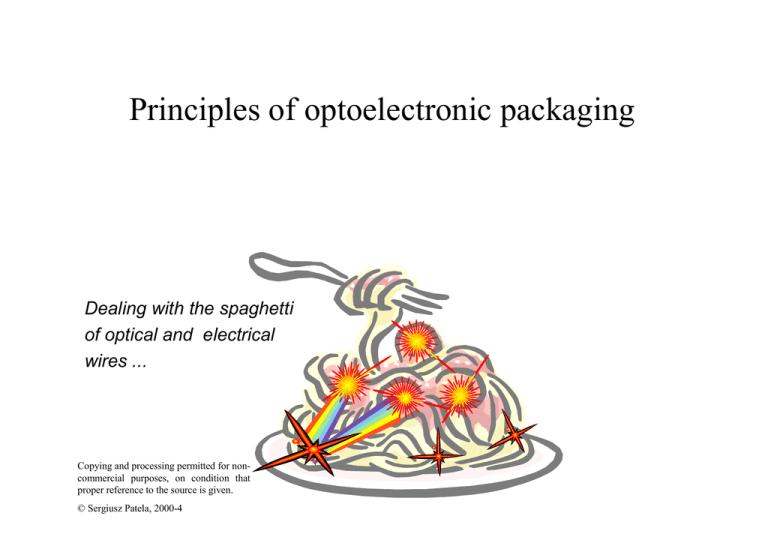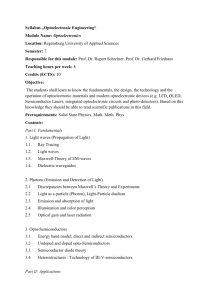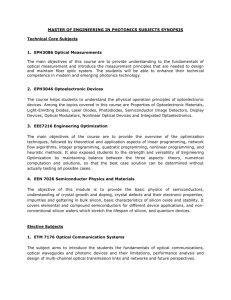Principles of optoelectronic packaging
advertisement

Principles of optoelectronic packaging Dealing with the spaghetti of optical and electrical wires ... Copying and processing permitted for noncommercial purposes, on condition that proper reference to the source is given. © Sergiusz Patela, 2000-4 Outline 1. Introduction 2. Optics of optoelectronic packaging 3. Classifications and packaging systems 4. Optoelectronic package requirements 5. Assembly conditions 6. Generic optoelectronic package 7. Design solutions 8. Some notes about materials (c) Sergiusz Patela 2001 Photonic Devices. Optoelectronic Packaging 2 Introduction Packaging – a sequence of technologies that involve • connecting, • protecting, • and manufacturing of the devices Wafer processing Packaging O-e device Packaging 20 10 80 90 In optoelectronics the package accounts for 60 to 80 percent of current manufacturing expenses in component assembly (in microelectronic the proportion is reversed) (c) Sergiusz Patela 2001 Photonic Devices. Optoelectronic Packaging 3 Micro versus optoelectronic packaging - similarities, differences, challenges Microelectronics devices Optoelectronic devices • high frequency design • high frequency design • optimized automatic assembly • optimized for manual assembly • planar design • 3D design, difficult visual inspection • electrical connection • electrical and optical connections • components easily recognized (with metal lines as the references) • fiducial markings necessary to enable visualization and recognition of some elements (c) Sergiusz Patela 2001 Photonic Devices. Optoelectronic Packaging 4 Future – replacement of electrical interconnections with optical interconnections Sooner or later, the wire bonds will talk ... • Limitations of classical electronic interconnections (speed, density). • Compatibility of optical transmission systems and termination (switching, processing) modules (c) Sergiusz Patela 2001 Photonic Devices. Optoelectronic Packaging 5 Optoelectronic device fabrication • • • • • Wafer processing Thin film processing Device and subassembly packaging Fiber handling and alignment The finishing steps of tuning, adjusting and testing Question - Why is it so challenging ? Answer - Multiple, proprietary fabrication techniques and processes involved, coupled with a lack of package and material handling standards. (c) Sergiusz Patela 2001 Photonic Devices. Optoelectronic Packaging 6 Optoelectronic devices assembly process Chip fabrication Cleave facets Facet coatings Package and wire bond Burn-in test and bin Mount and subassembl y Align and bond fiber Test and labeling (c) Sergiusz Patela 2001 Photonic Devices. Optoelectronic Packaging 7 Technologies for optoelectronic device assembly Process Description Eutectic component attach In-situ pulse heat, Au-Sn preform (for heat dissipation) Epoxy component attach Electrically conductive and nonconductive adhesives Wire bond Au wire (25µm diameter), Au ribbon (75µm wide) Fiber alignment Passive of active Active component (c) Sergiusz Patela 2001 Laser, detector, lens, fiber Photonic Devices. Optoelectronic Packaging 8 Optics of optoelectronic packaging – light coupling Optical loss factors: 1. Efficiency of power transfer (insertion loss) 2. Reflections reduction (back reflection) Modeling issues: depending on device dimensions • wave optics or • ray optics approach has to be applied. (c) Sergiusz Patela 2001 Photonic Devices. Optoelectronic Packaging 9 Optoelectronic packaging, the history and the future 1. Early days - manual assembly 2. Contemporary - semiautomatic or automatic assembly; small or medium scale production 3. The future - fully automatic assembly; massive scale production; short time to market for new components Note - nowadays optoelectronic packages are complex devices themselves - composed of optical, microwave and thermal elements. New diagnostic methods will be necessary optoelectronic devices/ packages (c) Sergiusz Patela 2001 Photonic Devices. Optoelectronic Packaging 10 Diagnostic methods for optoelectronic packaging Testing 1. Operational properties optical (power/sensitivity, coupling efficiencies, optical bandwidth) electrical DC electrical RF 2. Structural properties (conformity with design detail, internal cracks and voids) 3. Thermal properties Note: 3D visualization is required optical and optoelectrical elements of the package (c) Sergiusz Patela 2001 Photonic Devices. Optoelectronic Packaging 11 Mode Field Diameter Power density profile of guided light beams can be approximated by Gaussian function: r 2 p(r ) = p(0) exp− 2 w0 2wo is called the mode-field diameter (MFD). It is diameter at e-2 ~ 13.5% of Pmax λ MFD = A + B CD λc D A, B, C, D = empirical parameters, λc – mode cutoff wavelength (c) Sergiusz Patela 2001 Photonic Devices. Optoelectronic Packaging 12 Optoelectronic packaging - classification according to the packaging system 1 Alignment type Passive 2 Active 3 Mixed (c) Sergiusz Patela 2001 Notes Possible very high adjustment accuracy. Inexpensive equipment. Different dies are needed for different application . Universal equipment, can be expensive if high precision is required. Feedback during positioning guarantees device perfomance. Photonic Devices. Optoelectronic Packaging 13 Example of mixed optoelectronic packaging Schematic showing the construction of the package and the principle of the mixed packaging (note infrared die-bonding) (c) Sergiusz Patela 2001 Photonic Devices. Optoelectronic Packaging 14 Photonics devices to be packaged 1 Device Laser diodes types FP, VCSEL, DFB, DBR 6 Detectors 2 3 DWDM multiplexers and switches Filters Mainly semidonductor Grating, waveguide, FBG 4 Couplers 5 Isolators 6 Optoelectronic integrated circuits (c) Sergiusz Patela 2001 Intereference, FBG Fused, integrated optics Magnetooptic rotators applications Telecommunications, datacom., sensors, aoutomotive industy. All kinds of systems High speed fiber optic transmission (SM) High speed fiber optic transmission (SM), sensors Fiber optic systems of all kinds. SM, MM, POF fibers. High speed telecom. In connection with high quality lasers. Advanced systems Photonic Devices. Optoelectronic Packaging 15 Design type and package requirements 1 Construction class Free space 2 Waveguides 3 Photonics devices arrays (c) Sergiusz Patela 2001 Requirements Lenses, beam co llimation, (micro)optical beam-forming elements But-coupled waveguides, high adjustment accuracies Thermal problems arise for emitting devices. High packaging density (new connector styles may be required – e.g. SFF connectors). Photonic Devices. Optoelectronic Packaging 16 Application and package requirements 1 Application Telecommunications 2 Datacom., networks 3 4 5 Automotive industry Medicine Sensors (c) Sergiusz Patela 2001 Packaging requirements Mainly SM fibers, very high accuracy, 20+ years working time High accuracy and reliability, SM and MM fibers, in the future possibly POFs in massive market (FTTH) Very high reliability, lower accuracy. Special material requirements Custom parameters, system dependent. Photonic Devices. Optoelectronic Packaging 17 Optoelectronic packaging - assembly conditions 1 2 3 4 “Optical-path” Assembly-Conditions Accuracy Requirements <1µm for SM systems, >1µm for MM systems. 10 up to 100µm for POFs and automotive applications. Alignment (levels of freedom) X, Y, Z with different accuracies in different directions. Φ (angle). Alignment method Visual (microscope, camera, image processing) or infrared (“see through the surface”, observation of “hot” active transmission devices (near infrared). Other assembly issues Optical connection efficiency Electrical (electronic protection, ESD) Thermal Hermetization (c) Sergiusz Patela 2001 Photonic Devices. Optoelectronic Packaging 18 Communication system level packaging hierarchy Level 1. System level Contents general System service functions 2. Cabinet level Functioning of the system on the rack 3. Unit level Interconnection between packages 4. Board level Board functioning. Power supply Contents optical Interconnection distance Network interconnections ≥ 100 m 5. Fiber level 6. Beam level Cabinet level interconnection Interconnection between modules On-board device interconnections and signal transmission Optical fiber placement Beam focusing (c) Sergiusz Patela 2001 Placement Stability, precision Photonic Devices. Optoelectronic Packaging ~ 10 m <1m ~ 10 cm ~ 1 cm ~ 1 µm 19 “Generic” optoelectronic package active element(s) with adjustment system electrical connections cover (hermetization) fiber holder and adjustment segment fiber support and temperature stabilization module (c) Sergiusz Patela 2001 window, flat or lens special optical elements (isolators, filters, …) Photonic Devices. Optoelectronic Packaging 20 Fiberoptic photonics systems • Telecommunications systems. High performance, very high reliability and longevity (up to 30 years), very high unit price. Based on metal, glass, ceramic • Access network systems. High performance and reliability, medium life times (10 years). Low unit price. Based on polymer materials (c) Sergiusz Patela 2001 Photonic Devices. Optoelectronic Packaging 21 Comparison of different LD – fiber coupling techniques Butt coupling Tapered waveguide coupling (c) Sergiusz Patela 2001 Photonic Devices. Optoelectronic Packaging 22 LD coupling with lenses possibilities Single lens double lens cylindrical lens GRIN lens (c) Sergiusz Patela 2001 Photonic Devices. Optoelectronic Packaging 23 waveguide core planar waveguide singlemode waveguide F-O to strip waveguide coupling substrate Butt - coupling of fiber and strip waveguides polished surface singlemode waveguide additional block of substrate material substrate with waveguide Butt coupling of the waveguides with strengthening element block of substrate material strip waveguide UV-hardening glue epoxy glue fiber waveguide substrate (c) Sergiusz Patela 2001 Waveguides connection with fiber strengthening element (ruby bearing) strenghtening element Photonic Devices. Optoelectronic Packaging 24 waveguide core singlemode waveguide planar waveguide Butt coupling vs. lensed fibers substrate Butt - coupling of fiber and strip waveguides waveguide core singlemode waveguide planar waveguide substrate (c) Sergiusz Patela 2001 Lensed coupling of fiber and strip waveguides Photonic Devices. Optoelectronic Packaging 25 Angled waveguides coupling Polymeric waveguide as short-distance optical interconnections. 45 mirrors applied for use as connects between MM fibers and VCSEL’s. Waveguide: d-PMME, UV-cured epoxy resin. Insertion coupling loss 1dB. (c) Sergiusz Patela 2001 Photonic Devices. Optoelectronic Packaging 26 Diluted waveguide (beam-shape engineering) Elliptical field distribution, incompatible with optical fiber planar waveguide light towards optoelectronic element taper strip waveguide Cylindrical field distribution, compatible with optical fiber InGaAsP towards fiber waveguide InP (c) Sergiusz Patela 2001 Photonic Devices. Optoelectronic Packaging 27 Diluted waveguide optical field distribution Fiber waveguide 1 Fiber 1 waveguide Planar waveguide Planar waveguide 0,5 Fiber 1 waveguide Planar waveguide 0,5 0,5 0 -1,E-05 -5,E-06 0,E+00 5,E-06 Waveguide thickness [µm] 1,E-05 0 -1,E-05 -5,E-06 0,E+00 5,E-06 1,E-05 0 Waveguide thickness [µm] Optical field distribution of a planar and fiber waveguides. Misalignment results in large coupling losses. (c) Sergiusz Patela 2001 -1,E-05 -5,E-06 0,E+00 5,E-06 1,E-05 Waveguide thickness [µm] Optical field distribution of fiber waveguide and thinned (tapered) planar waveguide. Field widths are similar, but distributions still differ. Photonic Devices. Optoelectronic Packaging Optical field distribution shaped both by taper and diluted (multilayer) waveguide 28 Simple standard package Waveguide Standard elements TO5 package PIN photodetector Telecommunications PIN photodiode with fiber pigtail in standard TO5 package (c) Sergiusz Patela 2001 Photonic Devices. Optoelectronic Packaging 29 Design of the laser module baseplate laser isolator holder lens cap sleve shuffle plate fiber assembly lens isolator Fiber assembly laser lens isolator glue fiber primary coating solder H. van Tongeren, et al., IEEE Transactions on Components, Packaging and Manufacturing Technology - Part , vol. 18, (1995) 227. (c) Sergiusz Patela 2001 Photonic Devices. Optoelectronic Packaging 30 Optoelectronic packaging of advanced modules Microwave package U-grove Conducting glue Fiber waveguide Alundum substrate Microwave SMA connect. Optoelectronic modulator in a microwave package. Package contains modulator chip, microwave preamplifier, impedance matching circuit. microstrip line Laser diode package. Laser diode on submount, thermistor and photodiode (c) Sergiusz Patela 2001 Photonic Devices. Optoelectronic Packaging 31 Arrays packaging Schematic structure of the 2-D VCSEL module (c) Sergiusz Patela 2001 Photonic Devices. Optoelectronic Packaging 32 Materials – selection criteria 1. Temperature properties (resistance, stability, resistance above 100C, 200C for short time, thermal coefficients of expansion) 2. Optical properties (attenuation, refractive index) 3. Mechanical properties 4. Manufacturability 5. Environmental resistance (weatherability) 6. Price, availability (c) Sergiusz Patela 2001 Photonic Devices. Optoelectronic Packaging 33 Package types utilized in optoelectronics Component Dual-mode direct feedback laser Tunable laser Package 14-pin butterfly TO-56 High pin-count butterfly. Low aspect ration custom package Pump laser 14-pin butterfly TO-46 High aspect ratio rectangular. External modulator Custom package Variable optical attenuator Coaxial cylindrical package Receiver TO-3, TO-18, TO-46, Butterfly. Low aspect ratio custom package Large square custom package. Optical switch Small cubic custom package Isolator, coupler, splitter Differing length cylindrical packages (c) Sergiusz Patela 2001 Photonic Devices. Optoelectronic Packaging 34


